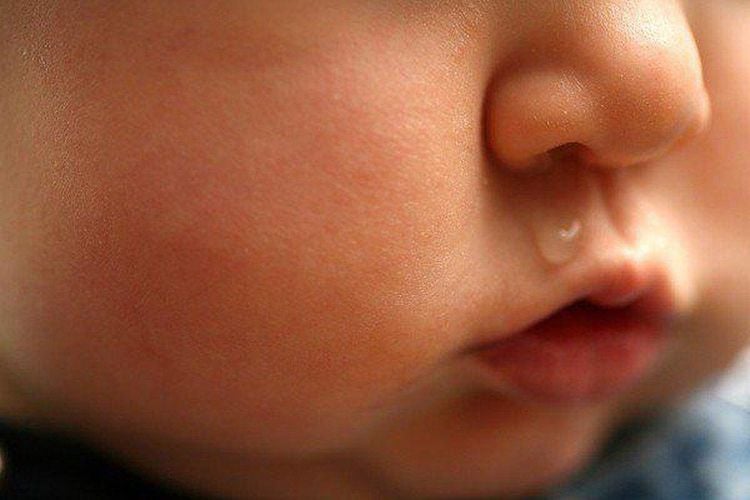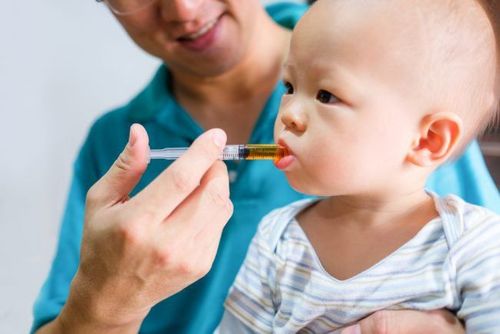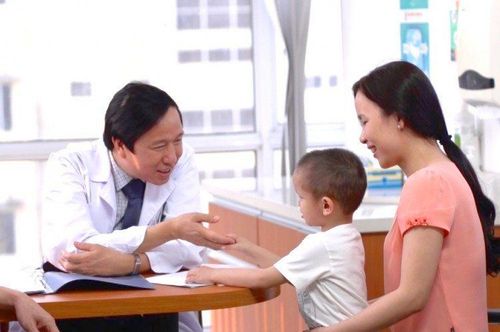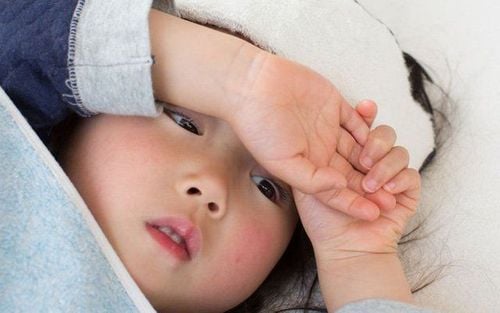This is an automatically translated article.
Children with colds are common, especially among toddlers. If not handled properly, these children with weak immune systems can experience complications such as bronchitis, pneumonia,... The article will provide detailed information to help parents prevent and manage suitable treatment for children
1. Typical Symptoms of a Cold in Toddlers
Typical symptoms of a cold in toddlers or young children include:
Runny nose with clear mucus, which may or may not be thick and then turns gray, yellow or green Congestion Mild Cough Mild Fever (but not always)
2. How do I know if my toddler has a cold and not the flu, allergies or some other illness?
Your toddler or young child's appearance and behavior can tell: If your child has a runny nose, cough, and possibly a low-grade fever, but is playing and eating as usual, it could be a cold.

Trẻ bị cảm lạnh thường bị sổ mũi
3. How long do colds last in toddlers and young children?
The second or third day is when cold symptoms usually peak, then improve gradually over 10 days to two weeks. If your child has cold symptoms that last for more than a few weeks or their symptoms get worse instead of getting better after a few days, call the doctor.
4. Measures to ease your child's cold symptoms
There is no medicine that makes the virus that causes colds go away faster, but you can help your toddler or young child feel better and prevent the infection from getting worse by making sure they are Get proper rest and drink plenty of water.
For safe ways to soothe your child's cold symptoms, apply home remedies that really help, including calming breath using physiological saline and absorb as well as add moisture to the air. Specifically, saline nasal drops and humidifiers can help babies breathe easier. Toddlers may find it easier to sleep when their heads are up and cold foods are soothing to their throats. Older children can gargle and even use a spray bottle. And children of all ages can benefit from resting, drinking water...
5. Is it safe for toddlers or young children to use over-the-counter (OTC) cough or cold medicines?
It depends on the age of the child. However, studies show that over-the-counter cough and cold medicines including decongestants, cough suppressants, and expectorants do not relieve cold symptoms in children under 12 years of age and can sometimes cause cold symptoms. negative, or even dangerous, side effects. The American Academy of Pediatrics (AAP) recommends the following:
Under 4 years of age: Do not give cough or cold medicines to very young children, including 14-month-old children with a cold, because they can cause dangerous side effects, even even life-threatening. From 4 to 5 years: Only give cough or cold medicine when prescribed by a doctor. 6 years and older: It is safe to give cough or cold medicine but follow dosing instructions carefully. If your child has a fever and is unusually irritable or irritable, ask your doctor about giving your child acetaminophen or ibuprofen.
Never give aspirin to toddlers or young children because it makes them more susceptible to Reye's syndrome, a rare but potentially life-threatening complication.

Sử dụng thuốc cho trẻ cần có hướng dẫn của bác sĩ
6. When to see a doctor
Call your doctor if your toddler or young child has cold symptoms and any of the following:
High temperature (about 38 degrees Celsius or higher) Cold symptoms can may get worse or not start to improve after a week Dry or severe cough Coma Irritability or unusual fussiness Poor appetite Vomiting Diarrhea You can also call your doctor if your toddler do you have:
signs of mild dehydration Signs of an ear infection include ear picking or discharge Symptoms of red eyes (conjunctivitis), such as redness of one or both eyes and lower rims of either eyelid, plus thick discharge Any symptoms of illness that affect your health, even if those symptoms are not specifically mentioned above.
7. When to Seek Urgent Medical Care
If a child's cold has any signs of respiratory distress, seek immediate medical attention (talk to a doctor, or call the emergency room) when the child is new. walking has the following signs:
Pigmentation of the skin blue, regular rapid breathing, head bobbing with breathing rhythmic whining rhythm with breathing, nostrils rising and falling when breathing, sucking the skin above the collarbone or between or below the bone Whispering, coughing, or wheezing sounds when breathing Some warnings to be on the lookout for: If your child doesn't wake up or shows no signs of waking up, or shows signs of severe dehydration, seek medical attention. get emergency medical care or go to the emergency room.

Tình trạng ho của trẻ nặng hơn cần đưa trẻ đến bác sĩ
8. What can I do to reduce the number of colds my toddler or young child gets?
To help reduce your child's exposure to germs and strengthen his or her defenses against colds with healthy habits, such as:
Wash your hands. Help your child wash their hands well and encourage everyone in the house to do the same. Stay away from people who are sick or are sick or showing signs of illness. To the extent possible, keep your child away from other children and sick adults. Cover your mouth when coughing or sneezing. Instruct everyone in the household to cover their mouths with a tissue and then walk away when they cough or sneeze. Alternatively, let the child cough or sneeze into their arm and then rinse. Always keep your child well hydrated Keep toys clean at all times. This is especially important if children share their toys with their friends. Avoid secondhand smoke. This can put the child at a higher risk of upper respiratory problems. So keep your kids away from smokers and keep them away from areas where people are smoking. In the case of children living with smokers, these children are more likely to get colds than children who are not exposed to smoke, and the duration of colds can also be longer than that of children who are not exposed to tobacco smoke. Children are not exposed to secondhand smoke. Keep vaccinations up to date. Vaccinations won't protect toddlers or young children from catching a cold, but they can prevent more serious infections.
9. Why do toddlers and young children get so many colds?
Their immune systems are immature, making them more susceptible to illness than older children. In addition, more than 200 different viruses can cause the common cold, and children will develop immunity to them at a time.
For young children, especially toddlers, the child's act of grasping everything will be the cause of the child's illness. Because children's hands are very easily exposed to cold viruses. Someone with a cold in close contact with the child can also expose the child to the virus. Children can also get sick by putting contaminated fingers in their mouth or nose, or by rubbing their eyes. Even breathing in the air after an infected person coughs, sneezes, or talks can spread the virus.
Children may get sick more often during the fall and winter months because cold viruses are more widespread during that time of year. Children should be kept indoors more in cold weather, and being close means the virus can spread from person to person more easily. Toddlers typically get about eight to 10 colds each year. However, by the time they go to elementary school, kids who go to daycare are less likely to catch colds than kids who don't.

Trẻ cũng có thể bị bệnh khi đưa ngón tay bị nhiễm bẩn vào miệng
For children to be healthy and develop well, it is necessary to have a nutritious diet in terms of quantity and quality balance. If children are not provided with adequate and balanced nutrients, it will lead to diseases of excess or lack of nutrients, which adversely affect the comprehensive development of children in terms of physical, mental and motor skills.
Children who do not eat properly are at risk of micro-mineral deficiency causing anorexia, growth retardation, malabsorption,... If they notice the above signs, parents should supplement their children with products. The supplement contains lysine, essential micro-minerals and vitamins such as zinc, chromium, selenium, and B vitamins to help fully meet the nutritional needs of children. At the same time, these essential vitamins also support digestion, enhance nutrient absorption, help improve anorexia, and help children eat well.
Parents can learn more:
Signs of zinc deficiency in children
Micronutrient deficiency and failure to gain weight in children
Please regularly visit Vinmec.com website and update useful information to take care of your child. Take care of the baby and the whole family.
Reference source: Babycenter.com













